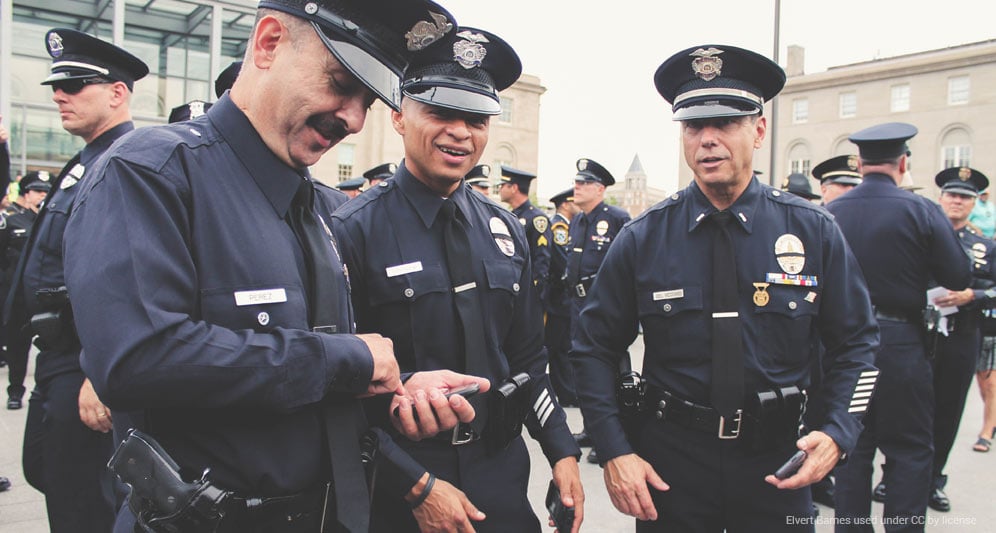Article highlights
- Types of social media your policy should cover
- Structure of a good social media policy
- Additional resources for your agency
There is no denying it – we live in the age of social media.
With the rise of Facebook, Instagram, and Twitter, we have more opportunities than ever to make valuable connections.
Social media can certainly be a helpful tool, but it can also be destructive if left unmanaged in a law enforcement environment. In fact, there are cases of litigation due to unclear or unenforced social media policies.
That’s why now is the time to think about creating a social media policy for your department.
According to the IACP Center for Social Media, a law enforcement social media policy is crucial for several reasons.
“The development of sound policy is integral to efficient agency operations. As with many new technologies and issues, the use of social media requires a well-articulated policy that addresses the unique concerns and functions of a law enforcement agency.
“It is important to involve key stakeholders during policy development such as representatives from the legal and communications office for your agency or unit of government.”
Now that you know the importance of social media policies, the next step is developing your own.
Before you dive in, think about what you want your policy to cover.
Obviously, it is difficult for any policy to cover every aspect of social media usage. There are, however, a few examples of topics you need to consider.
Official department profiles and accounts
Your department plays a significant role in the safety of your community. For this reason, an official social media profile can be a useful tool. You could use it to share information with your constituents, as well as for community outreach and recruitment.
However, if it is not managed well, a social media profile could be a source of embarrassment or misunderstanding.
Think about who you will give authority to create and accounts and post on behalf of your department before you opt in.
What information are you willing to publicly share with your community, and during which parts of the investigation? For example, will you divulge evidentiary photographs or keep them secure?
It may also be helpful to define a tone or personality you want your agency to portray online.
Use your department's values as a general guideline, and create a social media tone guide around it. This is an excellent opportunity to consider (and adhere to) any communication policies you have already developed.

Make sure you define consequences for violating these guidelines, including determining when a post will be taken down.
Keep in mind that deleting a potentially inappropriate post can sometimes be as damaging as the post itself.
Use in active investigations
Social media can also be an incredibly useful tool in investigations involving missing or wanted persons, gang participation, and cyberstalking.
It is your responsibility to be proactive in defining procedures and safeguards to protect the safety of your investigators. These safeguards could protect the integrity of your investigation.
Specifically, you will need to consider requirements for retaining records.
In a Social Media Concepts and Issues Paper, the IACP states that though there are federal guidelines, every agency is responsible for its own policies.
“While federal law enforcement agencies must abide by the United States Freedom of Information Act, state and local agencies are responsible for adhering to state and local guidelines on open record availability and archiving.
“Each state has unique caveats to their laws and agencies must be aware of these and the distinct challenges they present for social media content.”
Personal use of social media
There are a few exceptions, but officers’ use of personal social media falls under the umbrella of protected speech.
As evidenced in a recent Virginia case, even when it comes to critical posts, free speech protects officers’ right to post what they want on their social accounts.
This makes developing social media policy for personal use difficult, especially since officers have access to sensitive information.
How can you as an agency protect officer safety and career integrity when it comes to handling your agents’ personal decisions?
You may not be able to control their behavior off the clock, but you can and should place prohibitions on speech that could undermine or impeach an employee’s testimony in court.

This would include defamatory speech, sexually explicit communication, or derogatory speech toward a protected class. It could also involve any communication to or about potential witnesses.
Ask yourself if you will need any additional restrictions on those who work under cover or want to pursue an undercover assignment.
Consider similar restrictions with employees identifying themselves as members of the force.
For example, you can create policies about posting pictures in uniform or at the station. Such expectations will protect the integrity of your agency.
Be clear about any monitoring that will take place by the department and document disciplinary protocol if you find someone in violation.
Writing Your Department’s Policy
You have defined aspects of social media you want to address. Now it’s time to begin developing your department’s social media guidelines.
I. Clarify your purpose
Before implementing any policies or procedures, get clear about your intent.
Your officers will better connect with your guidelines when you base them on values like professionalism, integrity, respect, reputation, and ethics.
Try to focus on your department’s mission and culture as you develop social media policy.
Lauri Stevens, a media consultant for law enforcement agencies, has helpful insight in her article Update on Social Media Policies.
“No matter what you read or who you talk to, always honor the culture of your own organization when developing policy. If your agency doesn’t need to be overly restrictive and punitive with social media, especially with regard to how you expect sworn officers to behave when representing the department, you will know it.
“Moreover, the agency will benefit because the officers won’t feel like it’s just not worth doing because it’s too easy to get into trouble.”
II. Define your terms
Precision is very valuable when you are creating policies and addressing compliance.
Make sure your social media policy is explicit about what media it addresses.

Consider personal websites, blogs, social media accounts, and any other media that could affect your department. Lay everything out for your officers so they understand from the beginning.
It may also help to offer definitions of key concepts like speech, profile, and social networking.
III. Determine official uses
As stated above, a department social media account could be a great resource to connect you to your community.
However, you need to establish clear methods of managing it to avoid issues.
Determine ahead of time who will create, maintain, and oversee the department’s social media strategy. Establish style standards or guidelines for each account to keep tone consistent.
It may also help to put procedures in place regarding content approval and responses to incoming messages.
Clarify when and how you will use official accounts, listing out any acceptable uses in your social media policy.
Consider specific use cases like investigative tools, notifying the public of real-time events like road closures, weather issues, Amber or Silver alerts, recruiting new officers or volunteers, or community outreach.
IV. Restrictions on personal use
Your officers are protected by free speech when it comes to social media.
However, you can still list some restrictions in your social media policy.
Photos in uniform, comments about ongoing investigations, or personal use on the clock are good examples.

You may also want to include precautions and suggestions that help protect the credibility of the department.
V. Procedures
All policies need their own corresponding procedures to ensure proper compliance.
When it comes to social media, be clear about what procedures you will be using to enforce your policy.
Use this opportunity to focus on the specifics.
Examples include any approval processes, monitoring, or discipline for social media violations. Making sure everyone is on the same page from the beginning will support you in your journey toward compliance.
It will also give your department an edge when it comes to excellence and safety.
Compliance is all about ensuring efficiency, safety, and professionalism in your agency, and every policy and procedure you develop will end up serving your community.
In a world that disseminates information faster than ever, defining an effective social media policy will only promote positive results, protecting you and your officers when it matters most.
Learn more about writing effective law enforcement policies today.
Additional resources for your agency
Here are some helpful links to help you craft your department’s social media policy: